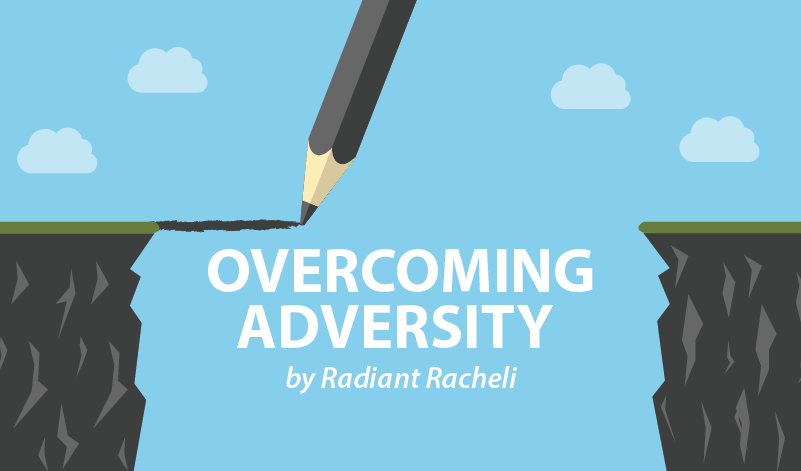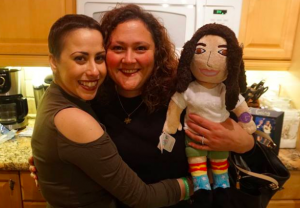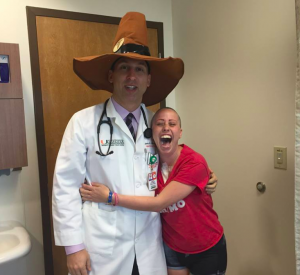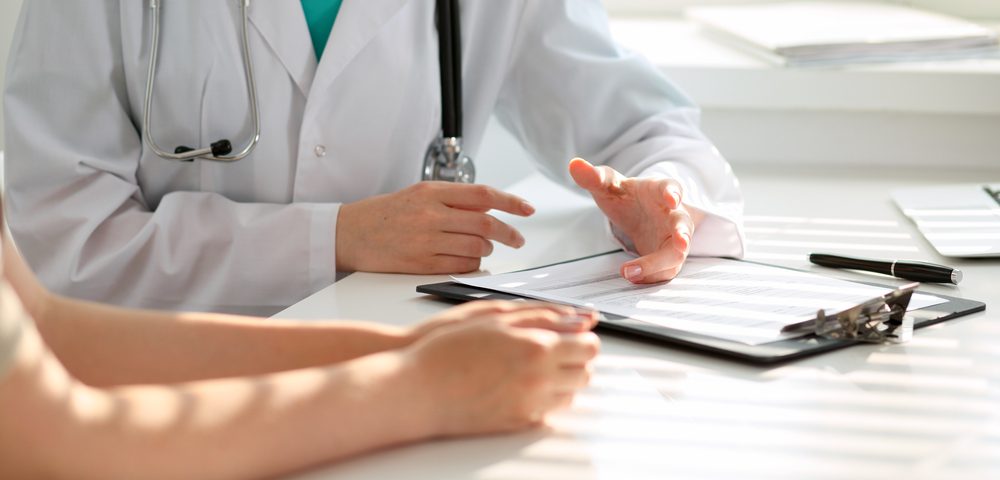
I have met so many different patients who have had incredibly different journeys and experiences throughout my lymphoma diagnosis. There are many moving parts to a cancer diagnosis, and many things that can make or break your experience. Among those that helped me remain so positive and uplifted was my healthcare team. I’d love to share and give credit where it’s due, and also guide other patients to finding a healthcare team that will make their experience with cancer the “best” it can be.
Here are some things I appreciated throughout my care, and would recommend looking for when searching for a healthcare team.
-
Look for an oncologist who is willing to meet with you for over two hours on a day when he doesn’t typically see patients, two days after you email him because his schedule is booked out for another month.
While this is on the extreme side, I highly recommend an oncologist who will give you undivided attention, and sit with you for as long as you need, to cover all your questions and share observations. There is nothing worse than an appointment being cut short by a doctor, and feeling like you are just another number on a list of things to do that day.
- Make sure that your oncologist’s nurse will write you a recommendation letter and hand deliver it to your house the night after chemo.

Me and my amazing nurse, Dana, and the Dana Doll at my remission party. It’s not just your oncologist who has to be awesome. Most of the time you are interacting with the nurses in the clinic, so be sure to scope out the vibe that the nurses give when deciding which oncologist’s office to stick with.
- Find an oncologist who will overnight you a prescription for a cranial prosthesis (a wig).
No need to look at this so literally. Gestures like this show that your doctor isn’t just understanding you on a medical level, but on an emotional level as well. When it comes to a cancer diagnosis, our image is taken away from us most of the time. Find a doctor who understands that having a wig can be just as important as having your medicine. It can be crucial in grasping onto a sense of your identity and some oncologist’s do not understand this.
- Find a doctor whose nurse practitioner is willing to pick up your computer charger that you forgot (chemo brain) in your hospital room and FedEx it to your house.
OK, there’s not much of an explanation for this one. It’s the little things. - Find an oncologist who will call you with the (good!) results of the PET scan you took that day. While on vacation. With the family. In Alaska.
This really happened! Why is this important? This shows that while your doctor does deserve time off to be with family, he or she totally understands the struggle of scan-xiety, and knows how important and special it would be to know that the treatment is working!
- When you are diagnosed with a pulmonary embolism, and insurance is making it a hassle to get to the hospital from chemo, make sure you find a doctor who is willing to personally drive you to the hospital. Most cancer patients know the hassles of health insurance. It can be so difficult to get things approved, or for the insurance company to understand the sense of urgency. That is why it is so appreciated when your healthcare team understands your struggle with these things. While insurance can sometimes make our experience with cancer a little harder, it’s nice to have a doctor and healthcare staff that puts effort into minimizing the stress that insurance, and the need for approvals, may cause.
- Find an oncologist who will educate you. It’s important to have a doctor/healthcare staff that is going to help you understand what is going on in your body, and thoroughly explain your treatment plan with you. Too often I’ve met patients who have no idea what is going on and what the drugs they are taking are actually doing to them. While ignorance may be bliss, I personally felt it was important to have a doctor who helped me understand medical jargon, symptoms and side effects. If your prerogative is to not be in the know, find a doctor that fits that need!
- Find a doctor who truly believes “there is no such thing as a stupid question.” I always had ridiculous and thorough questions for my doctor because I wasn’t taught “How To Have Cancer” in school. Who else is going to answer these questions for me, aside from Google? While Google and the internet can be great, sometimes it’s not quite accurate. The best person to ask would be your oncologist, but you have to have an oncologist who is willing to answer all of your questions.
- Stick with the healthcare team that asks you about your pole dancing hobbies. OK, maybe you’re not into pole dancing, but whatever your hobby may be, find a doctor who cares about you enough to know about you outside of cancer.When I first met my nurse, one of the first things she told me is that I don’t have cancer when I walk out of the infusion center. I am only a cancer patient in that building, and at my appointments. While we know that’s not exactly the case, words and messages like that showed they care about me enough to want me to keep my pre-cancer identity.
- Remember that second opinions exist and are encouraged!

Me and my doctor on the day of my last chemo. While being diagnosed with cancer and starting treatment may be urgent, your well-being through treatment is just as urgent! If you don’t feel “it” when you meet with your first oncologist team, GO. SEE. ANOTHER. DOCTOR.
I am not joking when I say this. It is like when you are trying on a wedding dress. If you don’t feel the magic, don’t buy the dress! Except in this case, your life is in the other person’s hands. So make sure you have trust, comfort and reliability before you commit to being treated for cancer by the doctor you meet with.
What’s your relationship like with your doctor and their staff? Leave your thoughts in the comments!
***
Note: Lymphoma News Today is strictly a news and information website about the disease. It does not provide medical advice, diagnosis, or treatment. This content is not intended to be a substitute for professional medical advice, diagnosis, or treatment. Always seek the advice of your physician or other qualified health provider with any questions you may have regarding a medical condition. Never disregard professional medical advice or delay in seeking it because of something you have read on this website. The opinions expressed in this column are not those of Lymphoma News Today, or its parent company, BioNews Services, and are intended to spark discussion about issues pertaining to lymphoma.


